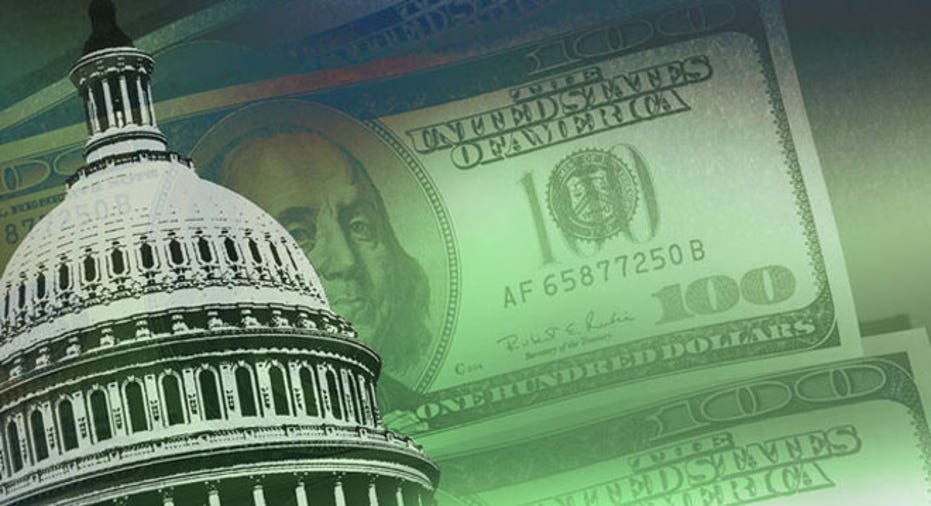In Fickle Washington, D.C., Deficit No Longer a Priority

Congress and the White House collectively have a short attention span.
Stock markets have surged in the first half of 2013 and housing prices are climbing again, rebuilding much of the wealth lost during the recent financial crisis. One upshot of all that recreated wealth is that the U.S. deficit is now projected to creep lower over the next decade, a sharp turnaround from forecasts of the past few years.
Ratings firm Standard & Poor’s noted these positive signs Monday when it raised the U.S. outlook to stable from negative.
Rather quickly these developments have allowed Congress and President Obama to move on from arguably the signature issue of the president’s first term – the sharply divisive battle over government spending and the need for deficit reduction.
For the past several years it’s seemed as if the government was constantly careening toward one fiscal deadline or another. In each case, Armageddon was predicted as each side of the political spectrum attempted to use the deadline to gain leverage over their rivals.
The positions became familiar: Democrats called for higher taxes on the wealthy and the elimination of tax loopholes, while Republicans refused any new taxes and called for broad cuts in government spending.
All the while negotiations were supposedly being held on some sort of “grand budget deficit bargain” that would satisfy everyone through a mix of targeted higher taxes and selective spending cuts.
“There was a lot of lip service but not a lot of political will to do anything about it."
There was the fight over raising the debt limit in the summer of 2011, a battle that included threats of a U.S. default and which led to S&P’s historic downgrade of U.S. credit. That was followed by a budget impasse in late 2011 that included the threat of a government shutdown. Then there was the “fiscal cliff” deadline of Jan. 1, 2013, which dangled the threat of ostensibly catastrophic across-the-board budget cuts and sweeping higher taxes if no deal was reached.
In each of those instances, after much huffing and puffing, politicians essentially kicked the can down the road, not once addressing the long-term issues of tax and entitlement reform. Most analysts agree that, despite the recent reprieve, deficit problems are sure to return without fixes to the unwieldy and in many cases unfair tax code as well as the increasingly costly entitlement programs Social Security and Medicare.
But political cycles shift and Washington, D.C., has lately been consumed by “scandals” and legitimate legislative battles outside the fiscal realm, namely over gun control and immigration reform.
Deficit Was "Never Really the Issue"
“As the economy improves the deficit will become less of a political issue,” said Stan Collender, a partner at Qorvis Communications and a former staffer to both the House and Senate Budget Committees.
In fact, from Collender’s perspective the deficit “was never really the issue.” Instead, the argument was actually an ideological fight over the size of government and the vast amounts of money it spends.
From a budget perspective, the deficit never posed an “imminent threat” to the fiscal stability of the U.S. economy, Collender noted. Consequently, “there was a lot of lip service but not a lot of political will to do anything about it,” he said.
Besides, politics being what they are, if it wasn’t a fight over the deficit tying up Congress’ legislative agenda “it would have been something else,” Collender said.
There are viable arguments both in favor of immediately pursuing deficit cutting legislation and leaving it alone for the time being.
Deficit hawks argue that postponing hard decisions on reforms to Medicare and Social Security will only make it harder for those programs to avoid insolvency by mid-next decade, as the trustees of both programs recently projected.
In addition, as noted in a recent report from the Committee for a Responsible Federal Budget, a bipartisan group led by prominent deficit hawks Alan Simpson and Erskine Bowles, the level of debt as a percentage of GDP has fallen but the dip may be temporary. Projections call for debt levels to start rising again later this decade, probably around 2018.
Those calling for taking the foot off the gas pedal say annual spending caps and tax increases put in place by the Obama administration have cut spending, raised revenues and eased the sense of urgency. At the same time, recent forecasts for health care spending costs have fallen.
These off-setting factors mean no long-term deal is likely to emerge from Congress any time soon.
Deficit Reduction Offers Few Political Gains
Bill O’Grady, chief market strategist at Confluence Investment Management in St. Louis, views the deficit essentially as a political football, something to be tossed back and forth as administrations come and go.
“The deficit is always the problem for the party out of power,” he said, citing Democratic rancor during the Reagan administration in the 1980s and then Republican criticism during the Clinton administration in the 1990s.
O’Grady said politicians are reluctant to pass broad deficit cutting legislation because it would anger too many constituents.
“Do taxes need to be reformed? Of course they do,” he said. “When two people who make the same amount of money are in different tax brackets that’s a problem. But a fully reformed tax program does nothing for a Congressman because they can’t give anyone anything.”
O’Grady said Bowles’ and Simpson’s 2010 recommendations for balancing the budget, which called for across-the-board spending cuts, including scaling back Medicaid and Social Security and cutting the federal workforce by 10%, gained no traction because politicians evidently viewed it as all pain and no gain.
In any case, the issue isn’t going away.
“The next recession it will become a problem again,” said O’Grady. “And all forecasts say by mid-next decade there are going to be some problems.”



















